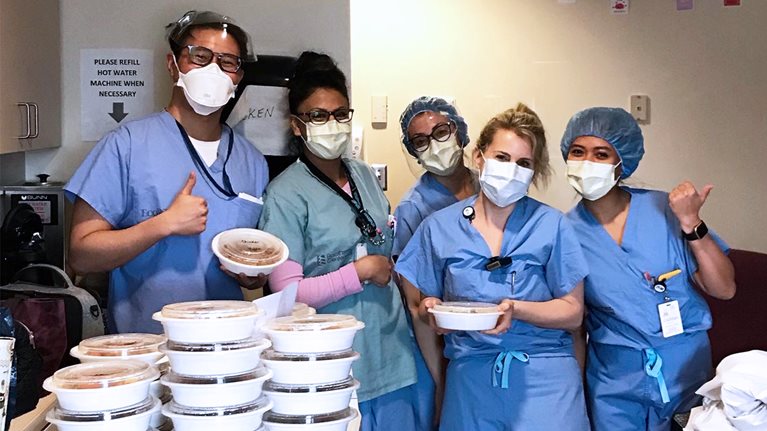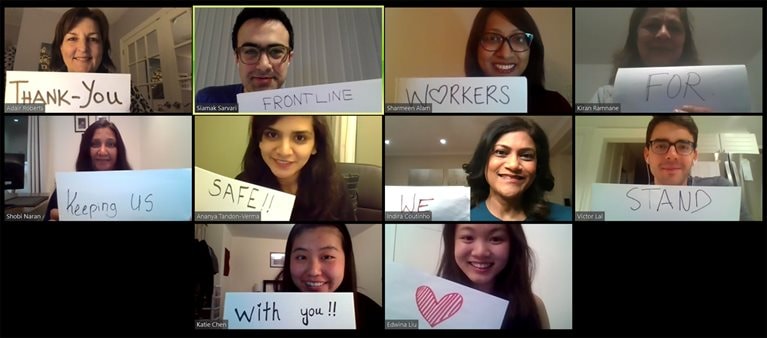In countries like the U.S. where small and medium-size businesses account for nearly 44 percent of the economy and employ about 59 million people, COVID-19 has put unprecedented strain on livelihoods.
One industry hit particularly hard is restaurants, and Siamak Sarvari, a McKinsey engagement manager living in Toronto, wanted to find a way to help. At the same time, Siamak’s wife happens to be a physician, which has given him a view into the reality of the front lines of this pandemic. Healthcare professionals, he knew, get very little time to prepare or eat their meals. So he thought there must be a single way to address two issues: support local Toronto restaurants to feed these front-line workers.
Siamak reached out to colleagues in our Toronto office, and a dozen replied eager to join the effort. “The idea was to buy meals from restaurants through donations that would then be delivered to healthcare professionals,” he explains. As he was getting the idea off the ground, he heard about a McKinsey alum who had already developed a program to carry out the exact same mission: Feed the Frontlines. Siamak was eager to connect.

Founded by Adair Roberts, a McKinsey alum and independent consultant who lives in Toronto, Feed the Frontlines raises community funds to purchase hot meals from local, independently-owned restaurants for healthcare and social-services workers battling COVID-19. For Adair, Feed the Frontlines was born out of an idea to help her friends Luca and Kate Di Pietro, restaurant owners in New York City. It started in mid-March with Luca and Kate delivering 40 donated dinners to the emergency department team at NYU Langone Tisch Hospital. Given its immediate success, Adair then brought it to Toronto.
After a few conversations with Adair, Siamak and a dozen McKinsey colleagues in Toronto joined forces. Within a month, the team has raised more than $200,000 from more than a thousand donors and delivered over 5,000 meals to 18 front-line organizations—all as volunteers working in their spare time.
“This is the power of the McKinsey training and culture,” says Adair. “It’s been 23 years since I left the firm and yet after a day or two of working with our expanded team, it felt like I’d never left.”

The team has daily morning check-ins that involve logistical planning and updates on where deliveries are going, how much money has been spent, and the pipeline for hospitals. “The level of rigor and attention to detail in everything has been amazing to see,” says Indira Coutinho, a McKinsey executive assistant. “At first, we were actually making the deliveries ourselves,” adds Sharmeen Alam, a McKinsey communications manager. “But we’ve since handed that off to the restaurants to manage on their own.”
What we’re doing is a small thing. But it’s something, and it helps take away the feeling of powerlessness that can come with a threat of this nature.
Currently, Feed the Frontlines delivers around 1,500 to 2,000 meals per week in Toronto, with plans to do more. “We constantly adjust this number,” says Katie Chen, a McKinsey business analyst. “It’s based on multiple factors, such as amount of unused funds, our fundraising target, how long we plan to sustain our operations, and the number of front line teams we support. We want to be extremely thoughtful about how we spend the donations since we know this pandemic is a marathon, not a sprint.”
Meanwhile in New York, the effort has provided nearly 80,000 meals to front line workers, and brought more than 100 restaurant industry employees back to work.
For Adair, the plan is to continue the support as long as the front line teams in Toronto are working under elevated pressure due to the COVID-19 pandemic. “What we’re doing is a small thing,” she says. “But it’s something, and it helps take away the feeling of powerlessness that can come with a threat of this nature.”